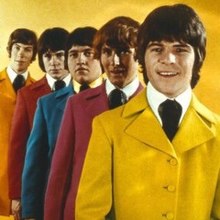Larry's Rebels
Larry's Rebels | |
|---|---|
 | |
| Background information | |
| Also known as | The Rebels |
| Origin | Ponsonby, New Zealand |
| Genres | |
| Years active | 1964–1970 |
| Labels | |
| Past members |
|
Larry's Rebels were a garage rock band, formed in Ponsonby, New Zealand, in 1964. The band had a relatively stable lineup, and had several nationally charting singles in New Zealand and Australia. Their musical genres ranged from blues rock to psychedelic pop, with lead vocalist Larry Morris having a versatile vocal range. The band later merged British Invasion and American musical influences into their repertoire.[1][2]
History
Beginnings
In 1962, classmates of the Seddon Tech institute,[
As Larry's Rebels, the band asserted themselves as the resident group at the Top Twenty Club, replacing
In late 1965, the group shared top billing with Ray Columbus and the Invaders at the Miss Auckland Personality Contest. Impressed by the performance, Russell Clark, the manager of Ray Columbus and the Invaders, agreed to oversee Larry's Rebels, and he soon finalized a deal with Philips Records.[7] With Russell, the band recorded demos for their debut single, many of which were rejected by the record company. Finally the group released their first single in December 1965 after settling with a cover version of Dionne Warwick's "This Empty Place". Though they did not manage to chart, the single sold well enough to encourage a second recording, with the folk piece "Long Ago, Far Away" being distributed in early 1966 to local success.[5]
Further recording and success
In mid-1966, Clark collaborated with
After a string of concerts in Australia in April 1967, promoter Ron Blackmore, head of the largest booking agency in
On the band's return to Auckland, Clark arranged a publicity stunt in which Morris rescued a Miss New Zealand contestant from a fall overboard from a cruise. The act was later admitted to be fake, but attention was drawn to the group's psychedelic
In early 1969, Morris, disillusioned by management, initiated a solo career. The last recording to include Morris was a take on
Discography
Studio albums
| Title | Details |
|---|---|
| A Study in Black |
|
| Madrigal (as The Rebels) |
|
Charting singles
| Year | Title | Peak chart positions |
|---|---|---|
| AUS [12] | ||
| 1967 | "Dream Time" | 85 |
| 1968 | "Everybody's Girl" | 98 |
Awards
Aotearoa Music Awards
The
| Year | Nominee / work | Award | Result | Ref. |
|---|---|---|---|---|
| 2020 | Larry's Rebels | New Zealand Music Hall of Fame | inductee | [13] |
References
- ^ Richie Unterberger. "Larry's Rebels - Biography". allmusic.com. Retrieved 17 May 2015.
- ^ Mark Deming. "I Feel Good: The Essential Purple Flashes of Larry's Rebels 1965-1969". AllMusic. Retrieved 24 May 2015.
- ^ a b c "Larry's Rebels Profile". audioculture.co.nz. Retrieved 18 May 2015.
- ^ "Simple Image". sergent.com.au. Retrieved 18 May 2015.
- ^ a b c "Larry's Rebels". sergent.com. Retrieved 22 May 2015.
- ^ "Larry's Rebels: I Feel Good (Frenzy)". elsewhere.co.nz. Retrieved 22 May 2015.
- ISBN 9781891241284. Retrieved 24 May 2015.
- ISBN 9781862546974. Retrieved 25 May 2015.
- ^ Steve kohler (2007). "NZ listener charts". Flavour of New Zealand. Retrieved 25 May 2015.
- ^ "I Feel Good - Larry's Rebels". Radio New Zealand. 18 April 2015. Retrieved 25 May 2015.
- ^ "Shop - Larry's Rebels". cherryred.co.uk. Retrieved 25 May 2015.
- ISBN 0-646-44439-5. Note: Australia had no contemporaneous national charts until Go-Set published their Australian National Chartsfrom 5 October 1966. Chart positions for 1940–1969 were back calculated by David Kent in 2005.
- ^ "HOME INDUCTEES". www.musichall.co.nz. Retrieved 16 August 2021.
External links
- AudioCulture Profile
- Larry's Rebels discography at Discogs
- Larry's Rebels at IMDb
